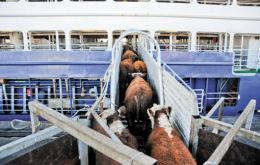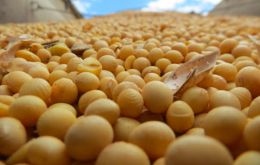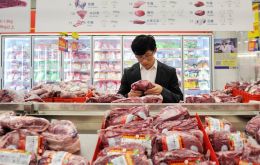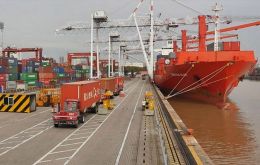MercoPress. South Atlantic News Agency
Tag: Exports
-
Tuesday, September 15th 2020 - 09:00 UTC
Southern Brazil leads in exports of live cattle: US$ 111 million in seven months

The port of Rio Grande in the Brazilian state of Rio Grande do Sul is shipping 4,000 head of cattle for Lebanon and 22,000 destined for Turkey, totaling 26,000 animals to be exported.
-
Tuesday, September 8th 2020 - 09:50 UTC
Chile post trade surplus in August but exports fell 10.8% and imports 22.4%

Chile posted a trade surplus of US$ 904 million in August, the central bank said on Monday, with a drop in levels versus a year earlier of both exports and imports for the month.
-
Wednesday, September 2nd 2020 - 09:50 UTC
Brazil/Argentina spat over non automatic import licenses delaying Mercosur bilateral trade

Brazil expressed its disenchantment with the Argentine policy of delaying the approval of the so-called nonautomatic import licenses which has seen millions of dollars in sales held at the border. This situation has been increasing in recent months, in what is considered a breach of bilateral accords in the framework of Mercosur agreements, and the World Trade Organization, WTO, rules.
-
Wednesday, September 2nd 2020 - 08:20 UTC
Paraguayan wheat exports drop 42% in July because of stricter controls in Brazil

The Paraguayan Chamber of Cereals and Oilseed exporters and traders, Capeco reported that the country's exports fell by 42.2% in July, with 267,949 tons, compared to 464,005 tons shipped in the previous month. This represents a drop of about 196,056 tons month-on-month.
-
Wednesday, August 12th 2020 - 08:27 UTC
Brazilian commodities exports booming: corn shipments exceed soybean

Data released on Monday by Brazil' Foreign Trade Secretariat (Secex) indicates that corn exports reached 2 million tons in the first week of August and exceeded soybean shipments in this period.
-
Tuesday, August 11th 2020 - 09:35 UTC
Record export of Brazilian beef in July; China becomes the insatiable client

Brazilian beef exports including fresh and processed products reached a monthly record of 194,093 tons during July, up 17% from the same month a year ago, according to the Brazilian Slaughterhouse Association (Abrafrigo).
-
Monday, July 27th 2020 - 09:13 UTC
Brazil soy bean exports to China soar to a record high in June: 10.1 million tons

China's soya bean imports in June from top supplier Brazil soared to a record high, according to customs data released on Sunday, driven by growing demand for soya beans as China's pig herd recovers after deadly outbreaks of African swine fever.
-
Wednesday, July 22nd 2020 - 08:00 UTC
Parana river insufficient water level benefitted exports from Brazilian ports

Due to the Paraná river drought, which affected Argentina’s soy oil-exporting capacity, Cattalini Terminais Marítimos, which handles almost 70% of Brazil’s soy oil exports through its facilities in the port of Paranaguá, predicts a 25% increase in shipments this year.
-
Wednesday, June 3rd 2020 - 11:52 UTC
Brazilian May exports reached US$ 18bn with a trade surplus of US$ 4,5bn

Last month, Brazilian exports totaled US$17.94 billion and imports, US$13.392 billion, which generated a trade surplus of US$4.548 billion. On the export side, there was a 4.2% decline in the daily export average from US$936.02 million in May 2019, to US$896.98 million in May 2020. In relation to imports, there was a 1.6% decline in the daily average over the same comparison period, from US$680.37 million to US$669.58 million.
-
Thursday, April 23rd 2020 - 11:05 UTC
Argentina's foreign trade during March dropped 17,6%

Data released on Wednesday by the National Institute of Statistics and Censuses (Indec) of Argentina showed that its foreign trade with other countries fell 17.6% in March, compared to year-ago. The trade flow reached US$7.49 billion, in the third month of the year.
